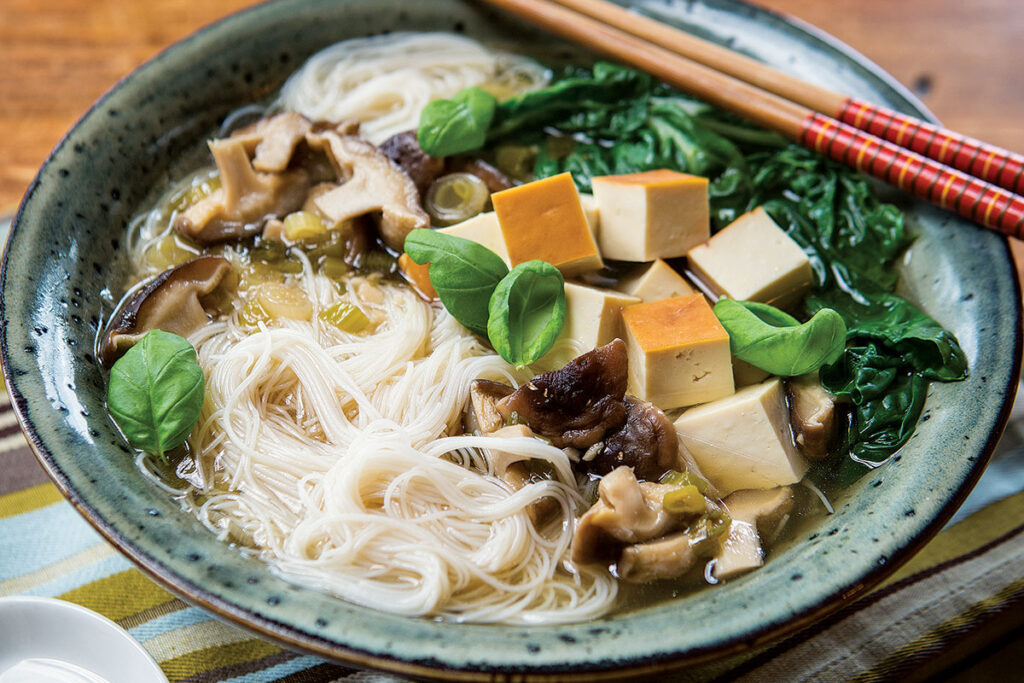Advertisement
Whole Grain Noodle Soups
Easy to warm up to

With holiday festivities now over, it’s time to return to the produce aisle and pantry for a little healthy meal inspiration. What we’re craving is pasta: rich bowls of whole grain goodness to warm us up.
What else do we want? Soup! Hearty, filling, and healthy, soup is the best way to lighten things up while still delivering the familiar flavours we gravitate toward in the cold weather.
Combining the best of both worlds, whole grain noodle soups are the ultimate way to satisfy our cold-weather comfort food cravings.
Whole grain pastas now come in as many varieties as there are winter days. From Kamut (khorasan wheat), spelt, and einkorn to gluten-free quinoa and brown rice varieties, there’s a wide world beyond white pasta to explore and savour. Choosing whole grain pasta over the refined variety is not only a tastier choice, but healthier, too, delivering B vitamins, vitamin E, protein, fibre, and myriad minerals.
With soup, a little pasta goes a long way, giving us the comfort food texture we love in a portion-controlled way—especially important for diabetics monitoring their sugar levels. In addition, whole grain pasta digests gradually, keeping blood sugar levels from plummeting and hunger pangs at bay.
Like a comforting hug, a bowl of soup will brighten even the greyest of winter days. Put the soup-can opener to rest this season and warm up with these globally inspired whole grain pasta soups.
Advertisement
Recipes
- Fragrant Tofu and Bok Choy Pho with Brown Rice Vermicelli
- Spicy Thai Coconut Soup with Kamut Noodles, Sweet Potato, and Lime
- Tortilla Soup with Spelt Orzo, Corn, and Black Beans
- Whole Grain Tortellini and Tomato Basil Soup
- Green Minestrone with Butter Beans and Brown Rice Fusilli
Advertisement
DIY vegetable stock
Homemade stock is a fantastic way to use the onion peels, carrot tops, garlic skins, and celery bottoms you’d normally toss. When cooking other dishes, freeze vegetable peels for a soup stock session.
- Add 8 cups (2 L) water to large pot along with 3 cups (750 mL) vegetable scraps; 4 cups (1 L) roughly chopped vegetables such as onion, garlic, carrot, and celery; and a handful of fresh thyme.
- Bring mixture to a boil, reduce to a simmer, cover, and cook for 1 hour.
- Remove vegetables and skim any foam. Using fine mesh sieve, strain mixture into separate large pot or bowl. Cool and transfer to containers. Stock can be frozen for up to 3 months (see “7 tips for freezing soup”).
Advertisement
7 tips for freezing soup
Keep these tips in mind when freezing soup for a quick, warming meal any night of the week.
- Save some room at the top of your container for expansion as your soup will inevitably “grow” in the freezer. It’s better to freeze a few smaller quantities than one large pot.
- Use glass containers or jars for freezing. Don’t forget to label and date what you’re freezing with a permanent marker and masking tape.
- Portion out 1 to 2 cup (250 mL to 500 mL) portions for single servings before freezing. This method is ideal for work or school lunches.
- Not every soup ingredient can be frozen. Keep pasta, tofu, and fresh greens out of your soup base if freezing, adding them when reheating. These ingredients have a tendency to go mushy and turn an unappetizing shade of grey if frozen.
- Puréed vegetable soups (squash, carrot, parsnip, tomato, etc.) freeze beautifully, allowing you to save the season. And don’t be afraid to add a handful of fresh greens, cooked pasta or whole grains, beans, or a cooked protein when reheating.
- If making a puréed vegetable soup for freezing, you can use less stock than the recipe calls for to reduce the space it will take up in the freezer. Thin with additional stock or water when reheating.
- Most soups can be frozen for three months; any longer and you’ll risk freezer burn.





